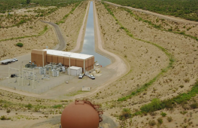WATER SCARCITY RESOURCES
-
The data center industry stands at a critical juncture. As facilities scale to meet exponential computing demands, water consumption has emerged as a defining operational challenge. Traditional approaches focused on water efficiency are no longer sufficient.
-
Water scarcity poses unique challenges to KW Resort Utilities Corp. (KWRU), the utility firm that provides wastewater management, wastewater recovery, and wastewater treatment in the region. KWRU began operation in the late 1960s and has worked hard over the decades to keep up with wastewater needs as population and tourism have boomed, spurred by land reclamation and development.
-
Amid the AI-fueled gold rush, more leaders are beginning to pay attention to the short- and long-term natural resource concerns, especially around all the water needed to keep data centers running.
-
Water pricing often fails to reflect scarcity, quality, or long-term risk, forcing companies to act internally. But this action is not being done in a vacuum. The ripple effect of internal water pricing is bound to impact water utilities, and ultimately, ratepayers and consumers.
-
Every year on November 19, Water Mission observes World Toilet Day — a day designated by the United Nations to focus on the importance of safe sanitation for all.
-
Global Water Outcomes expert notes that “water utilities are facing unprecedented challenges and opportunities,” citing the role of digital solutions moving forward.
-
Discover how a desert utility is evolving its operations to safeguard Tucson’s water supply for generations to come.
-
Water scarcity is increasingly impacting sectors from agriculture and energy to urban planning and high-tech manufacturing. Recently, industry leaders gathered to explore how new technologies and complex industrial demands are forcing a fundamental rethinking of water infrastructure.
-
Nobel-winning molecular materials are poised to reinvent purification, desalination, and reuse.
-
To combat drought, Abilene, Texas, implemented a reuse system utilizing O3 + BAC to remove trace organics. This solution met strict standards, ensured water resilience, and proved more cost-effective than AOP alternatives.











